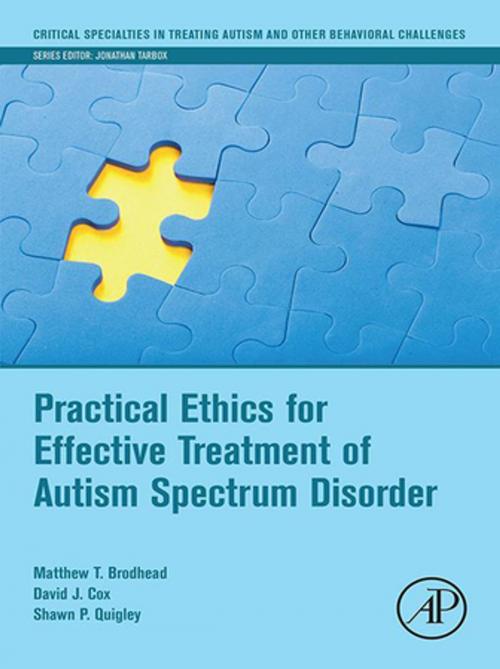Practical Ethics for Effective Treatment of Autism Spectrum Disorder
Nonfiction, Health & Well Being, Psychology, Child & Adolescent, Adolescent Psychology, Child Development| Author: | Matthew T. Brodhead, David J. Cox, Shawn P. Quigley | ISBN: | 9780128140994 |
| Publisher: | Elsevier Science | Publication: | July 18, 2018 |
| Imprint: | Academic Press | Language: | English |
| Author: | Matthew T. Brodhead, David J. Cox, Shawn P. Quigley |
| ISBN: | 9780128140994 |
| Publisher: | Elsevier Science |
| Publication: | July 18, 2018 |
| Imprint: | Academic Press |
| Language: | English |
Practical Ethics for Effective Treatment of Autism Spectrum Disorder is for behavior analysts working directly with, or supervising those who work with, individuals with autism. The book addresses important topics such as the principles and values that underlie the Behavior Analyst Certification Board’s ® Professional and Ethical Compliance Code for Behavior Analysts, and factors that affect ethical decision-making. In addition, the book addresses critical and under-discussed topics of: scope of competence; evidence-based practice in behavior analysis; how to collaborate with professionals within and outside one’s discipline; and how to design systems of ethical supervision and training customized to unique treatment settings. Across many of the topics, the authors also discuss errors students and professionals may make during analyses of ethical dilemmas and misapplications of ethical codes within their practice.
- Reviews core ethical principles
- Discusses factors that affect ethical decision-making
- Describes how to create systems for teaching and maintaining ethical behavior
- Discusses how to identify your own scope of competence in autism treatment
- Describes the process of evidence-based practice and how it can be applied to behavior-analytic treatment for autism
- Discusses the importance of interdisciplinary collaboration and how to be a good collaborator
- Reviews common mistakes students and supervisors make when analyzing ethical dilemmas, along with common misapplications of ethical codes
Practical Ethics for Effective Treatment of Autism Spectrum Disorder is for behavior analysts working directly with, or supervising those who work with, individuals with autism. The book addresses important topics such as the principles and values that underlie the Behavior Analyst Certification Board’s ® Professional and Ethical Compliance Code for Behavior Analysts, and factors that affect ethical decision-making. In addition, the book addresses critical and under-discussed topics of: scope of competence; evidence-based practice in behavior analysis; how to collaborate with professionals within and outside one’s discipline; and how to design systems of ethical supervision and training customized to unique treatment settings. Across many of the topics, the authors also discuss errors students and professionals may make during analyses of ethical dilemmas and misapplications of ethical codes within their practice.
- Reviews core ethical principles
- Discusses factors that affect ethical decision-making
- Describes how to create systems for teaching and maintaining ethical behavior
- Discusses how to identify your own scope of competence in autism treatment
- Describes the process of evidence-based practice and how it can be applied to behavior-analytic treatment for autism
- Discusses the importance of interdisciplinary collaboration and how to be a good collaborator
- Reviews common mistakes students and supervisors make when analyzing ethical dilemmas, along with common misapplications of ethical codes















